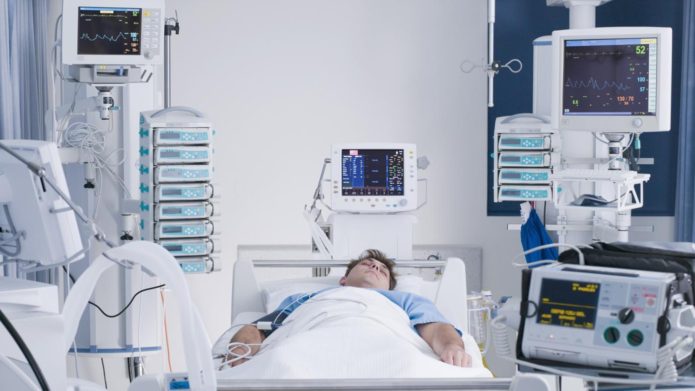Question:
Recently one of my patients suffered a massive brain haemorrhage (bleeding in the brain). He is 75 years old.
Medically speaking, no intervention can reverse his situation. He is in a coma (unable to open his eyes, or move his limbs, or talk). Medically he is brain-dead. Allow me to explain that brain death is the complete and irreversible loss of brain function. Brain death is one of the two ways that death is determined, the other way being the irreversible cessation of circulatory and respiratory functions.
Now in our case, his heart is beating and he is connected to a mechanical ventilator for breathing.
If the mechanical ventilator is switched off, he will most likely not be able to breath on his own, and as a result, he will die.
As a medical professional I have the following questions. I hope you can deliberate on these points as they are everyday decisions that medical professionals have to make.
Q. 1
What is the Fatwa of Ayatullah Sistani and the Leader Ayatullah Khamenei on the withdrawal/switching off of a ventilator for a brain-dead person?
Answer:
According to Ayatollah Sistani and Ayatollah Khamenei, as long as the heart beats, it is not permissible to remove the ventilator as much as possible, because a brain-dead person is not Islamically a dead person yet, and hence cannot be buried. However, according to Ayatollah Khamenei, donating and transplanting his organs under the following conditions is permissible:
a. Physical and clinical examination findings provide a clear aetiology of brain dysfunction
b. EEG for a continuous 8 hours confirms brain death
c. No drug intoxications such as Barbiturates have caused brain dysfunction
d. the patient is diagnosed brain dead by a medical professional and a brain-death certificate is issued
e. When the patient was healthy and conscious, he/she had willed to donate his/her organs in such circumstances, or saving a respected life (i.e. he is not a criminal whose life is not respected) depends on taking any of the patient’s organs including his heart
Q. 2
From the patient’s perspective: If we prolong life in a brain-dead person or someone who has no chance of recovery from his/her illness based on medical expertise, are we really prolonging life or prolonging the death/dying process? Should not the patient’s comfort come into question rather than how long they live? As we understand, the “pangs of death” or “sakaraat ul mout” is a very difficult time for a person. Shouldn’t he or she pass through it as quickly as possible?
Answer:
The main problem of our jurists here is that we are not allowed to take away someone’s life without legitimate reasons. A brain-dead person does not medically feel the pain, although even if he did the most we could do was to medically minimize his pain but not to take away his life, otherwise euthanasia and causing the death of anyone – who from his/her personal perspective is suffering medically or mentally – would be permissible too. Also, there are many people who live on medication without which they will die. Some of them are in the state of vegetation. Yet, stopping their lives is impermissible. From the Islamic and humanitarian perspective, we should endeavour to protect life even at its vegetation stage. Also, on the one hand we should utilize our knowledge to try to save and treat a patient as much as possible, but on the other hand, there is a hidden blessing and cleansing benefit for our souls to expire through illness. ‘Sakaratul-Mout’ or ‘the intoxication of death’ is not a physical phenomenon. It is more of the observation of life in Barzakh and its horror.
Q. 3
From the family’s perspective: Besides seeing a loved one in a difficult situation between life and death, if a family has to pay the medical bill for taking care of a patient whose life is artificially prolonged by a ventilator and causes them undue financial hardship, shouldn’t that be taken into consideration?
Answer:
The Almighty Allah states: “God burdens not any person beyond his scope.” (2:286) There are many patients in the world whom money could save their lives, yet since their families could not afford the medical expenses they are excused.
Q. 4
From the society’s perspective: the umber of ventilators are limited in medical hospitals. Shouldn’t a ventilator be made available to a young healthy person who has suffered a traffic accident and is expected to recover from his illness, as opposed to an old person who is brain-dead? Are we denying life-saving medical equipment to someone just to prolong life in another individual.
Answer:
In Fiqh (jurisprudence) we have a law called ‘the law of priority’. One of its applications is here. If there is only one ventilator that can be used either for an old man who is brain-dead i.e. medically there is no chance for his recovery, and a young person who is more likely to be recovered, then although both lives matter, the priority goes to the younger one or to whoever has more chance to recover, or the one for whom better reasons exist to keep them alive.
Q. 5
The hospital ethics committee can make a decision to withdraw ventilator support if the patient is found to be brain-dead. In this situation the patient or family’s wishes are not taken into consideration. What should we do in this situation?
Answer:
Then the burden of responsibility will be on them, and if the situation has not been compelling to justify withdrawal of ventilator, they are Islamically liable.
Answered by: Sheikh Mansour Leghaei



